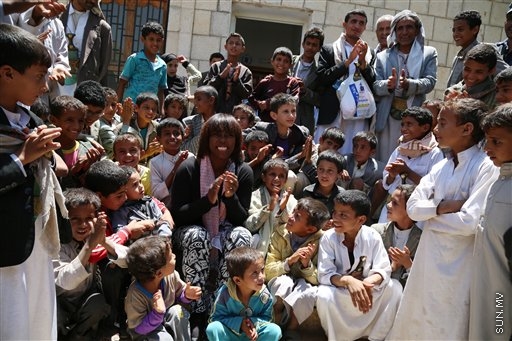
CAIRO (AP) — The war in Yemen has pushed the country to the brink of famine, with both commercial food imports and aid deliveries held up by the fighting and millions of hungry women and children facing possible starvation, the United Nations said Wednesday.
Ertharin Cousin, head of the U.N.'s World Food Program, said that while some food aid is flowing in, fighting around major ports is stalling deliveries, while reaching the country's interior is proving difficult and donor funding is still falling short.
"If we do not receive the additional access that is required to meet the needs of those who are affected by this ongoing conflict, if we cannot support the commercial markets by ensuring that the ports are open and providing food to ensure that those who have resources can buy the food that is necessary, and if we do not see increased donor support, we are facing the perfect storm in Yemen," she told reporters in Cairo.
Cousin was in Cairo following a three-day trip to Yemen. The WFP says all sides in the conflict must approve food deliveries.
U.N. humanitarian chief Stephen O'Brien, who also just returned from Yemen, told the U.N. Security Council "the scale of human suffering is almost incomprehensible."
He said he was shocked by what he saw: Four out of five Yemenis are in need of humanitarian assistance, nearly 1.5 million people are internally displaced, and people were using cardboard for mattresses at a hospital where lights flickered, the blood bank had closed and there were no more examination gloves.
Yemen's conflict pits Shiite rebels, known as Houthis, and troops loyal to former President Ali Abdullah Saleh against southern separatists, local and tribal militias, Sunni Islamic militants and troops loyal to President Abed Rabbo Mansour Hadi, who is in exile in Saudi Arabia.
The humanitarian situation has steadily deteriorated since the fighting picked up in March, when Saudi Arabia launched a U.S.-backed coalition air campaign against Houthi forces and their allies, which control large swaths of the country, including the capital.
Saudi Arabia views the Houthis as a proxy of its arch rival, Shiite powerhouse Iran, and an attempt to expand its influence on the Arabian Peninsula. Iran supports the Houthis politically but denies arming them.
Pro-government forces pushed the rebels out of the southern port city of Aden last month and have made gains in the surrounding provinces. But their advance stalled on Tuesday after a rebel ambush killed dozens of fighters.
Since August, the food program says it has been able to make 16 deliveries via sea to Yemen, accounting for over 123,000 metric tons of food. But difficulties remain because of the fighting, which has caused port closures. The western port city of Hodeida was hit with airstrikes Tuesday night.
"We actually had a ship berthed in port that was not damaged but had not been given clearance to offload when that bombing attack occurred," Cousin said. "We're bringing in food from Hodeida that because of the conflict we can't get to the south.
"We have right now, a ship sitting off the port of Aden that has materials in it that we could use in the south, and we're still waiting for permission for that ship to come in," she said, adding that in order to access the rest of the country, all the ports must be open.
Oxfam's country director, Philippe Clerc, said only two humanitarian vessels have been able to dock and off-load at the Hodeida port in the past more than two weeks.
O'Brien, the U.N. humanitarian chief, called the airstrikes and shelling at Hodeidah a violation of international humanitarian law, saying they damaged "the main lifelines" for importing crucial food, medicine and fuel and could severely impact the entire country.
Yemen, the Arab world's poorest country, needs to import food even in peacetime.
The WFP estimates that nearly 13 million people in Yemen lack proper access to food, with 6 million, or one in five of the country's population, in urgent need of assistance. The organization is seeking financial support for a $320 million emergency operation program it expects to launch in September.
Other organizations also registered alarm on Wednesday over the desperate situation in Yemen.
The U.N.'s humanitarian office says to 4,500 people have been killed and a further 23,000 have been wounded to date, many of them civilians.
Human Rights Watch and 22 other human rights and humanitarian organizations said that the U.N.'s Human Rights Council should create a commission of inquiry to investigate allegations of war crimes by all parties since September 2014.
In Geneva, the head of the International Red Cross said: "Yemen after five months looks like Syria after five years."
___
Associated Press writer Edith M. Lederer contributed to this report from the United Nations.